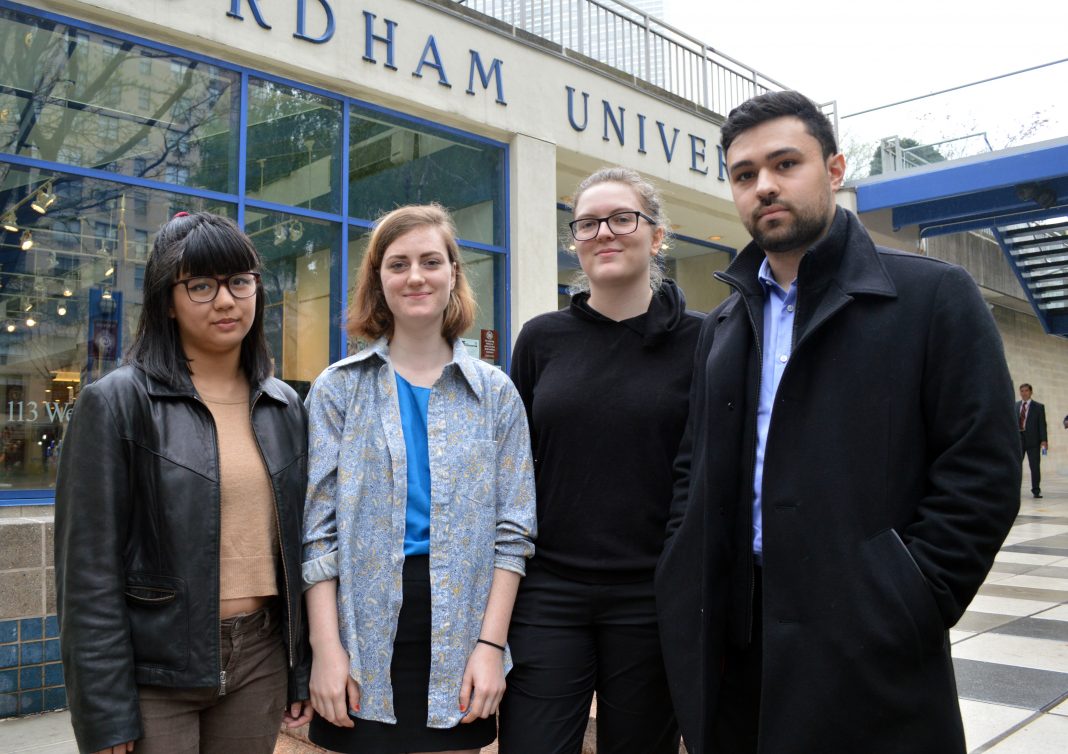Fordham SJP’s case against Fordham University was brought before the court by four petitioning students, Ahmad Awad, this reporter, Sapphira Lurie, and Julie Norris, who are represented by the Center for Constitutional Rights and Palestine Legal. Lurie, Norris and Dadap are also members of the ANSWER Coalition, an anti-war group. The students are asking the court to reinstate the United Student Government’s vote in support of establishing the chapter. As Fordham is a private university, this lawsuit is not making a claim of first amendment “free speech” but rather is making a claim based on Fordham’s own policy, mission statement, and stated commitment to “academic freedom.”
The court did not make a judgment, and a date has not yet been set for one.
Much of the arguments today focused on SJP’s support for the Boycott, Divestment, Sanctions movement, a nonviolent global campaign to pressure Israel to end its abuses of Palestinians’ rights. In legislative bodies around the country, there is an attempt to declare BDS illegal, and to wrongly equate support for Palestinian rights with anti-Semitism. In particular, college campuses have become a heated arena for the struggle to explain the plight of the Palestinian people and advocate for their rights.
Club baited as ‘terrorist-affiliated’
Fordham SJP’s case against the University was first filed on April 26, 2017, after Fordham College at Lincoln Center’s Dean of Students, Dean Keith Eldredge, vetoed the United Student Government vote to approve the club. His called SJP too “polarizing” a club to exist on Fordham’s campus, based largely on articles by right-wing sources suggesting that the thousands of college students around the country involved in the 200 or so chapters of SJP are terrorists or affiliated with terrorist organizations.
The same argument of “polarization” was presented in court on Jan. 3.
Center for Constitutional Rights cooperating counsel Alan Levine cited the existence of other clubs on campus which might be called polarizing for espousing specific political beliefs and advocating for their own positions on social issues. Among these clubs are Fordham’s Feminist Alliance and Rainbow Alliance (the LGBTQ club). Levine stated, “Fordham hasn’t advocated for LGBT rights, or feminist rights, but they have a club of students who do so.”
On the other side of the political spectrum, Levine pointed out, there exists Fordham’s long-standing anti-abortion club, “Respect for Life,” which until last year would put on a yearly display called the “Memorial of the Innocents.” This display features hundreds of white flags in the ground, in past years in the shape of a cross or a heart.
Fordham never condemned racist threats to SJP members
Fordham’s lawyers also claimed a potential for violence, disruption, or destructive behavior on the part of the club. As Levine argued, there is no evidence of violent behavior by SJP chapters.
Additionally, any hypothetical “violent behavior” would go against Fordham’s student code of conduct, and Fordham SJP’s proposed constitution explicitly promises not to break Fordham’s rules. The document explains that SJP stands against all forms of racism, discrimination, bigotry and oppression based on nationality, religion, and ethnicity; as Fordham’s own lawyer read these lines in court to try and prove that SJP’s primary goal was to “go against Israelis,” it became clear that this claim was not substantiated in the document.
In fact, it is SJP members who have experienced violence and harassment. Members of Fordham SJP have been the target of racialized threats and identity based harassment by other students and by external right-wing organizations. Fordham has never condemned these racist and dangerous actions against its students.
Fordham’s bias against BDS
Fordham’s lawyer also said, “Fordham does not want any association with the BDS movement.” This prompted comparisons to South African apartheid and the boycotts that happened against it around the world which proved to be an effective nonviolent tactic against it. The African National Congress, Mandela’s party and ruling party of South Africa, has repeatedly called Israel an apartheid state and condemned the occupation of Palestine, making BDS a part of its official platform in 2012.
Judge Bannon even chimed in, saying, “Ireland!” referencing the origin of the term “boycott” in historical Irish resistance against English colonial landlord, Colonel Boycott.
The tactics of boycott, divestment, and sanctions have been critical to Ireland’s and South Africa’s anti-colonial movements, and divestment campaigns have been employed for decades against fossil fuels, private prisons and dangerous farm labor conditions.
Fordham claims that they want and are legally entitled to distance themselves from the Boycott, Divestment, and Sanctions movement and from the “controversy” that is apparently attached to the name “Students for Justice in Palestine.” This appears to be based on a political and ideological opposition to the goals articulated by the international movement, which likely constitutes viewpoint discrimination on Fordham’s part.
Fordham complicit in colonialism and racism
Fordham states that the safety and lives of Palestinians are not in the balance here, that this is “just a student club.” In reality, the denial of an SJP shows complicity in colonialism and racism, and encourages other universities to act similarly toward students hoping to advocate for Palestine at their schools.
Fordham’s outright ban of SJP is a dangerous step in the direction of complete repression of speech advocating for the liberation of Palestine or even for increased awareness about the oppression of Palestinians. This is often called the “Palestine Exception to Free Speech.” It is meant to discourage people around the world from learning about the occupation, establishing meaningful solidarity or fighting to uplift the Palestinian movement for self-determination.
Despite this, the overflow of supporters and allies for SJP at the Jan. 3 hearing suggested that the anti-colonial internationalist spirit in solidarity with Palestine is alive and well.







